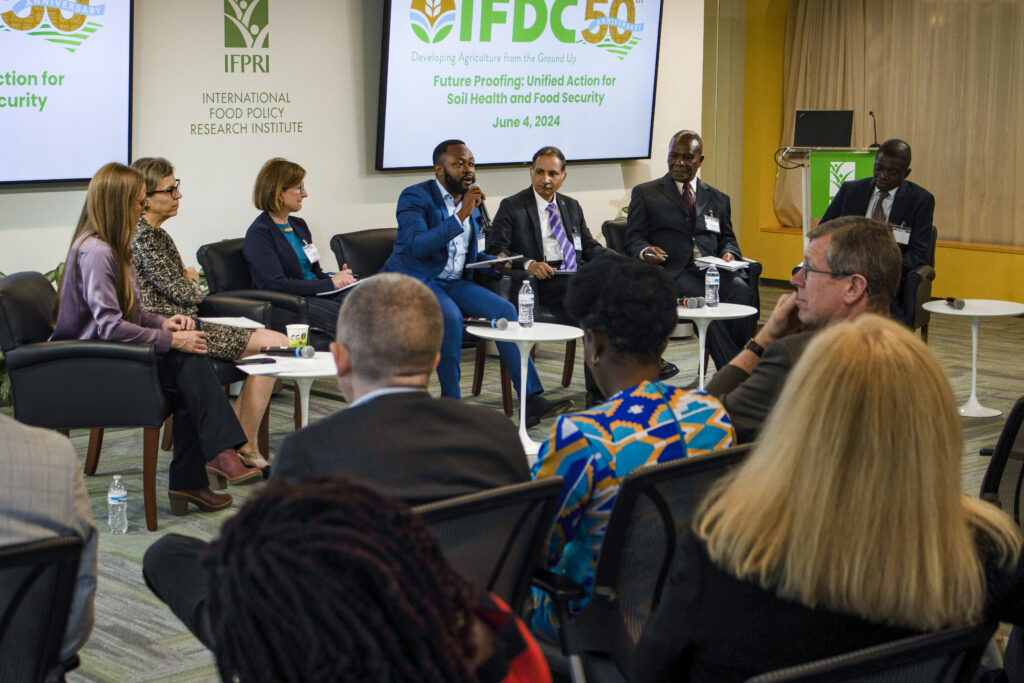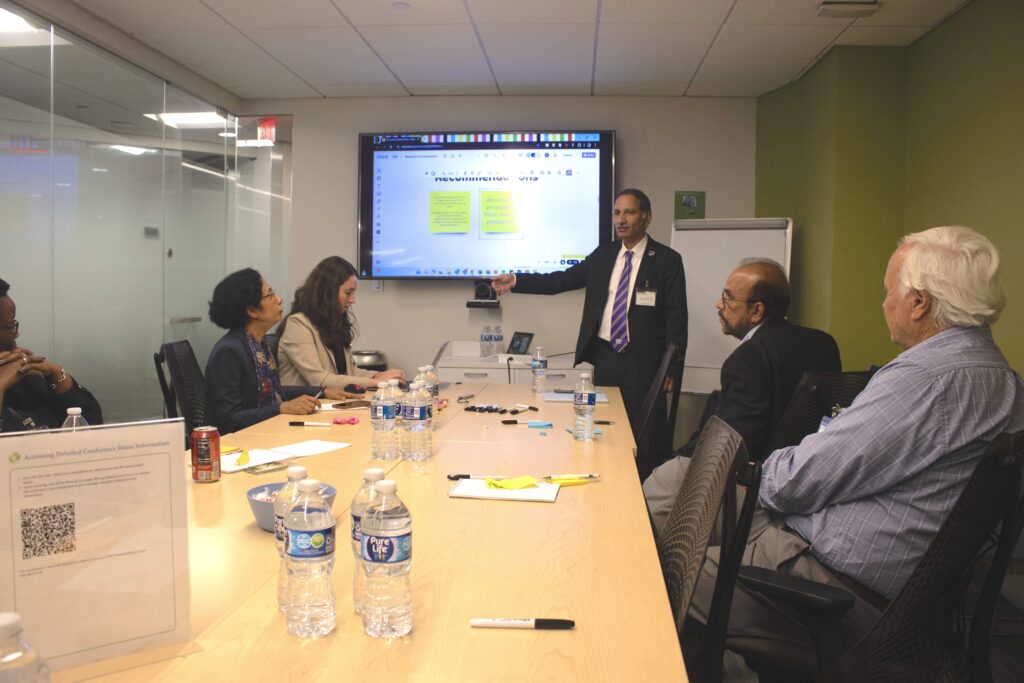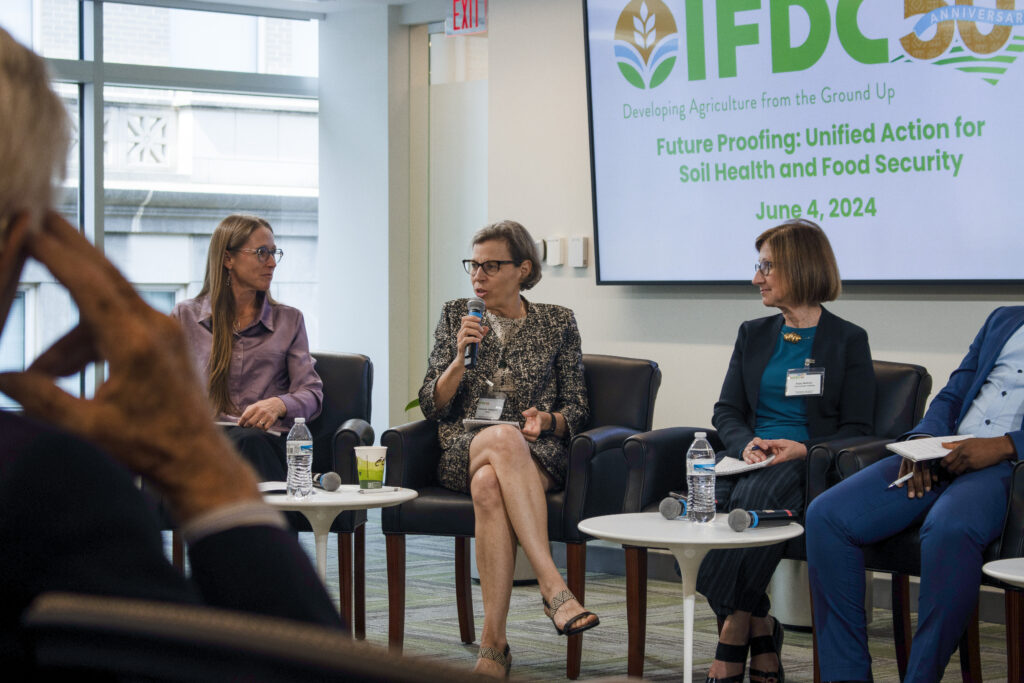
As part of its 50th anniversary symposia series, the International Fertilizer Development Center (IFDC) hosted “Future Proofing: Unified Action for Soil Health and Food Security” in Washington, D.C., on June 4. The event was designed to bring industry experts together to collaborate and accelerate the progress that has been made toward achieving global food security.
IFDC organized working group sessions to encourage networking and collective action from attendees beyond the daylong symposium. Attendees were sorted into five groups: producers and consumers, private sector, government and enabling environment, research and innovation, and financing. Each group was assigned a leader from within the respective sectors to guide conversations and identify paths to make Africa a leader in soil health and agricultural productivity. The breakout sessions quickly identified some common, critical leverage points of action:
- Public-private partnerships (PPPs) can work across sectors to achieve favorable outcomes for farmers and their soils.
- Soil mapping can be leveraged by farmers to inform their selection of fertilizers and crop rotation decisions.
- Sustainable soil management must be supported by policies that favor trade to strengthen markets at local, regional, national, and continental scales.
- Youth engagement is a valuable, yet overlooked, resource for soil management and food security.
- Data and communication must be coupled to maximize benefits for agricultural markets and soil health.
- Communication across sectors is crucial to achieving holistically beneficial results.
- Solutions for soil health must not be overengineered; sometimes, the simplest methods are the best.
- Governments should be included in conversations about repurposing subsidies.

Imaginative Collaboration
Engineering deliverable solutions required constructive debates within each working group. Groups defined problems in agriculture and worked together to find practical solutions, utilizing the knowledge of every group member. Below are some of the discussions and thought processes of the working groups.
Producers and Consumers, led by Dr. Tebila Nakelse, Research Lead, Virginia Tech Global Agricultural Productivity (GAP) Initiative
The producers and consumers working group sought to understand how fertilizer consumers could be better informed about the ingredients in fertilizers so that more deliberate decisions can be made for the good of African soils and agricultural productivity. Additionally, the group emphasized the importance of soil testing to evaluate soil quality at the beginning of a given growing season. The conversations centered on how to make fertilizer usage and soil health more accessible and practical in Africa.
The group concluded that the roles of producers and consumers need clearer definition, as there was disagreement on whether farmers are consumers of fertilizers or producers of crops. Clarifying these roles is essential for developing relevant solutions throughout the supply chain for smallholder farmers.
Private Sector, led by Kathy Mathers, Senior Vice President of External Affairs, The Fertilizer Institute
The private sector working group looked at how interventions along every point in the supply chain can offer solutions for fertilizer and soil health. The conversations examined how affordability can be leveraged to increase private sector engagement and intensify the public benefits of soil health solutions.
The discussion highlighted challenges currently hindering private sector investment in soil health, such as smallholder farmers’ limited market access. To remedy this, the working group found PPPs to be a promising opportunity to improve market engagement, agricultural productivity, and sustainability. Such partnerships would unite entities for soil health and encourage competitive solutions to soil nutrient deficiencies. Furthermore, farmers could enjoy more influence on the markets that they work within.
Government and Enabling Environment, led by Charlotte Hebebrand, Director of Communications and Public Affairs, International Food Policy Research Institute, and Dr. Richard Mkandawire, Africa Director of the Alliance for African Partnership, Michigan State University, and Chairperson, Malawi Planning Commission
The government and enabling environment working group discussed innovative and evidence-based policy suggestions for agriculture in Africa. The conversations focused on economic development as a leverage point for soil health; such an approach would socially uplift regions while also pursuing environmental sustainability.
The working group looked for ways to align governments with the outcomes of the Africa Fertilizer and Soil Health (AFSH) Summit to catalyze an enabling environment. One of the key results of the summit was the announcement of the Nairobi Declaration – a 10-year plan produced by the African Union that is dedicated to improving fertilizer use efficiency and soil health in Africa.
Since accomplishing the goals set during the AFSH Summit will require collaboration across all sectors in Africa, the team closed their session by asserting that governments can play a large role in creating incentives for partnerships through trade policy and subsidy funding regulations.
Research and Innovation, led by Dr. Vara Prasad, Director, Feed the Future Innovation Lab for Collaborative Research on Sustainable Intensification, and University Distinguished Professor, Crop Ecophysiology and Farming Systems (Agronomy Department), Kansas State University
The research and innovation working group explored opportunities to enhance public understanding of fertilizer in Africa, such as through training for farmers on the 4Rs of Nutrient Stewardship. Such extension is important for research and innovation because it brings new ideas into the global conversation about soil health while also creating opportunities for regional fertilizer development.
The group discussed how information about agricultural practices should be accessible to anyone who is interested – especially youth, women, and people with indigenous backgrounds. Prasad’s research prior to the symposium revealed significant opportunities to increase awareness about fertilizer usage as a mechanism for soil health. Some of the group’s proposed methods for increasing public awareness include online agriculture training, investment in undergraduate soil health and agriculture courses, and increasing local capacity to build digital agricultural tools.
Financing, led by Dr. Martin Paul Jr. Tabe-Ojong, Economist, World Bank
The financing working group examined how monetary support can contribute to soil health in Africa. The group highlighted that financially supporting data collection can improve soil health by creating opportunities to communicate data. By making farmers aware of the success of a particular farming method, the risk of investment in new technologies decreases. Farmers protect their livelihoods by avoiding excessive risks with new crops or farming methods, but both may be necessary to support their businesses in a world with an increased need for food. Group members also pointed out that the communication of data must be supported in its own ways; having the data is important, but it is only useful if it is properly conveyed to consumers to promote behavior change.
To avoid making executive decisions for consumers, the group addressed the need to engage with them and discover what they would like to see from their regional markets. The group settled on the idea that it could be effective to deconstruct the mindset of importing a large volume of goods to countries in Africa. There are benefits to domestic production that many producers have not experienced. The financing sector has the power to help producers add value and develop regional economies based on domestic production and sales. As with encouraging the adoption of new agricultural technologies, the promotion of domestic production will require communication via success stories to de-risk the proposed behavior change.

Takeaways
Following the working group sessions, the leaders participated in a plenary discussion in which they reported on their groups’ discoveries and recommendations. The working group leaders discussed obstacles to the accomplishment of food security and soil health in Africa while identifying solutions applicable to each sector. Alignment of local and regional efforts with national and continental visions – and vice versa – quickly emerged as the unifying approach among the sectors.
The symposium working groups were conceived to open communication between sectors and create partnership opportunities that endure beyond the symposium. The working groups will continue their deliberation at the upcoming IFDC “Future Proofing: Unified Action for Soil Health and Food Security” symposium in the Netherlands on November 4. Although group leaders may shift between the two symposia, they remain united in their goal to improve sustainable agriculture in Africa and to support existing efforts to do so.
The full plenary panel can be found here.




